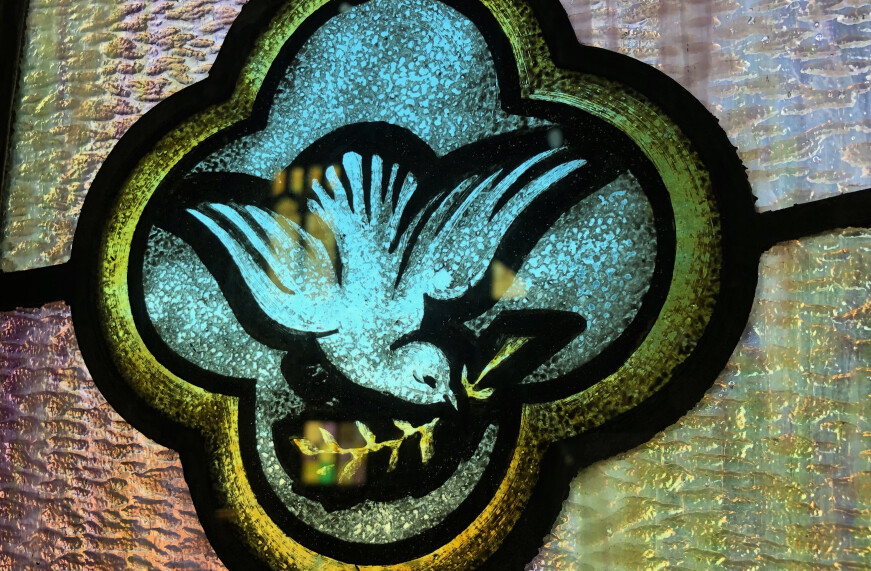Pastoring Exiles
Recently at the pastors’ conference hosted by the Rural Home Mission Association in Morton, IL, I heard Dr. Duane Litfin in a seminar set forth what he believes to be our new reality as Christians living in America. He said that we are vertical Christians living in a horizontal America. He made the case that America at its founding was a vertical nation, not a Christian nation, but definitely a vertical nation; that is, we used to be a people who assumed a transcendent reality and valued transcendent truth sourced from outside our material world. Today, Dr. Litfin explained, “official” America is a horizontal place. A vertical-ness is maintained for ceremony’s sake at times, but “official” America stopped looking to the transcendent for substance back in the 1950s. He exhorted the rural pastors in attendance to shepherd our flocks to be vertical Christians living in a horizontal society. He emphasized the idea that we were once truly vertical is not a myth; it was real, not imagined. However, he also cautioned that our goal as shepherds today must not be to return to the past. Rather, it is imperative that we learn how to live as the men of Issachar, “From Issachar there were 200 leaders and all their relatives at their command–they understood the times and knew what Israel should do” (1 Chronicles 12:32 NET).
As Dr. Litfin made his case, I thought to myself, “We need to study 1 Peter. He wrote to exiles.” Interestingly, the remaining plenary speakers all preached from 1 Peter. In this letter that bears his name, the apostle Peter wrote to the Diaspora. He acquired this term from the Old Testament writers, who often used it to describe God’s casting Israel into exile, scattering them throughout the nations, or to describe his regathering of his people from exile (e.g., Neh. 1:9; Ps. 146:2; Jer. 15:7; 41:17). In the Greek version of the Old Testament, Daniel warned that the final judgment for some would result in “eternal exile and shame” (12:2). The point is that diaspora or exile or dispersion is decisively negative; it means you are far from home; you are a stranger, an alien. Peter wrote in verse 1, “To those who are elect exiles of the Diaspora.” He has taken the Old Testament term and figuratively applied it to Christians who live in dispersion throughout a godless world, far from their heavenly home.1 The persecution and trials these believers faced evidenced the reality that they were not home, “In this [future salvation] you rejoice, though now for a little while, if necessary, you have been grieved by various trials” (1:6).
Born into a Hopeful Exile
While it is true that Christians are exiles sojourning in a godless world system, our exile is not swallowed up in doom and gloom. This has to do with how we became exiles in the first place. Peter wrote, “Blessed be the God and Father of our Lord Jesus Christ, who according to his great mercy caused us to be born again into a living hope through the resurrection of Jesus Christ from the dead, into an imperishable, undefiled, unfading inheritance reserved in heaven for you” (1:3–4). Peter blessed God because he gave us new birth; essentially, God made us exiles by awakening us from the slumber of a godless world, so that now we see how far from home we truly are. We are born into a godless world system, but we are born again into hope, a hope that is foreign to the world system.
This hope is described as “living.” It’s active. It is active in life-giving or life-producing. The hope with which a Christian sojourner travels is a life-giving hope—a strange thing to see in a dying, godless world. This hope is “the looking forward to something with some reason for confidence respecting fulfillment” (BDAG). The “something” that it anticipates is resurrection into a new home. The “reason” for the confident expectation is the resurrection of Jesus Christ from the dead. The resurrection of Jesus is not only the reason for our living hope, but it is also the instrument or means by which God caused us to be born again. Through the resurrection of Jesus, God exercises power to give us new birth as exiles who carry life-giving hope into the godless territories, neighborhoods, farms, schools, hospitals, state houses, and relationships wherein we roam.
When God caused us to be born again through the resurrection of Jesus into a life-giving hope, he also made us inheritors. The first thing to understand about this inheritance is that it comes from God. God caused us to be born again into it. Therefore, to the degree that “the God and Father of our Lord Jesus Christ” himself is imperishable, undefiled, and unfading so is the inheritance that he gives. Imperishable means not subject to decay, corruption, or death (cf. Rom 1:23; 1 Cor 9:25; 15:52; 1 Tim 1:17; 1 Pet 1:23; 3:4). God is imperishable; our resurrection bodies will be imperishable; the new-birth-causing word of God is imperishable; and, the qualities affected by this new birth are imperishable. Undefiled means unstained or pure in a religious and moral sense (cf. Heb 7:26; 13:4; James 1:27). Unfading means “not losing its pristine quality or character” (BDAG), like a flower that never, ever wilts. Lastly, God has reserved this inheritance for those whom he has born into this hopeful exile; therefore, it will continue imperishable, undefiled, and unfading for his definite purpose and until the suitable time. He has reserved it in heaven—in that realm of his presence untouched by decay, corruption, stain, or death—for us.
What Did Jesus Do in the Resurrection?
The noun used for our English word “resurrection” occurs forty times in the New Testament. Here in this one reference to it in 1 Peter 1:3–4, we learn that Christ’s resurrection from the dead placed an instrument into God’s hand that provides him the power to awaken exiles who live in a world in rebellion against him. In other words, his resurrection provided the instrumental means for the new birth.
So then, how do we as vertically-gazed, hopeful exiles live in a horizontally-gazed, godless country? How do we understand the time and know what to do? Peter has given us many answers to these questions throughout his letters. I think that 1:3–4 offers us these five clear directions.
First, acknowledge the exilic reality of the Christian sojourner in America. We are not a “Christian nation,” nor have we ever been. There was a time when we were a more vertical, religious nation, but even that has faded. This exilic reality should change your approach to “life as usual.” You are not of this world; your citizenship belongs elsewhere; you are a stranger and an alien, even in America.
Second, be careful to bless God for his great mercy and not to curse God because of your proud finitude. Only God is infinite. Agree in humility about your limitations. Rejoice greatly that the infinite God has drawn near with plenty of mercy for sinners. We live in a culture that loves to rejoice in its own finite accomplishments; in fact, we are so impressed with ourselves that we feel less and less needy for anything transcendent. Increasingly, we feel that the material world is capable of fulfilling all our hopes and dreams. On such a worldview, many are building their lives; their fall will be great and tragic. Be an exile. Build a humble life on the merciful character of God.
Third, if this all sounds strange to you, have you been born again? You may have all the trimmings and trappings of a religiously decorated life, but have you been reborn in Christ by the Holy Spirit? Peter explained that the resurrection of Jesus from the dead is God’s instrumental power for causing the new birth. Later he writes, “since you have been born again, not of perishable seed but of imperishable, through the living and abiding word of God” (1 Peter 1:23 ESV). It is precisely the word of God about Jesus, the good news of his resurrection from the dead, that God’s Spirit uses to cause the new birth. The apostle John has told us the same, “Now Jesus did many other signs in the presence of the disciples, which are not written in this book; but these are written so that you may believe that Jesus is the Christ, the Son of God, and that by believing you may have life in his name” (John 20:30–31 ESV).
Fourth, carry life-giving hope with you on your sojourn. If you have been born again, preach the resurrection of Jesus. When asked to give a reason for the hope within you, to give a reason for your holy and distinct life, declare the resurrection of Jesus. When the waiter asks why you pray, when the cashier asks why you smile, when the other fan or teammate asks why you aren’t dressing down the referee for the blown call, when the down-trodden classmate asks why you care, when the lost one is confused by your tireless search, when the wounded person takes a risk for healing and friendship, when the debtor wonders at your lack of attachment to money, when your co-worker’s burdens begin to surface, and when the addict stands at the edge of the grave they just finished digging, do not miss your opportunity to unpack for them the life-giving hope of the resurrection of Jesus Christ. Oh, brothers and sisters, this life-giving hope that we exiles carry with us is the most precious of all our cargo.
Lastly, live as possessors of a secure inheritance. The adversary and his world system love to leverage what they can offer you, but it is all “Mirkwood magic.” This reference is from J. R. R. Tolkien’s book The Hobbit. Before entering the forest, the sojourners were given sober advice to “STAY ON THE PATH.” The way became hard for them, and after staying the course for so long, they—one by one—saw something flickering in the distance. Leaving the path and hastening to what seemed to be sure, they arrived only for it to vanish, eventually leaving them swallowed up in silence and darkness. For the one born again into this hopeful exile, the chase is over. There is no other inheritance. God has reserved for us an imperishable, undefiled, unfading salvation. Live free from the leverage of the world. Live free from the deceit of magic. Live like possessors, adopted children and heirs, of a secure inheritance.
1 Fredrick William Danker (editor of BDAG), A Greek - English Lexicon of the New Testament and other Early Christian Literature, Third Edition (Chicago: University of Chicago Press, 2000). Electronic text hypertexted and prepared by OakTree Software, Inc, version 2.7.


